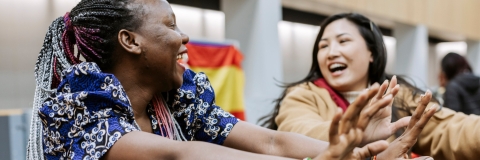
Get ready to grow, groom, and give back, because Movember is here with a lineup of exciting events at the University, from friendly competitions to our fun Shavedown kick-off.
Movember sees men across the world grow moustaches during the month of November to raise awareness of men's health and mental wellbeing.
Whether you’re sporting a moustache or just showing support, join your fellow students in making a difference and spark meaningful conversations.
Global Week 2025 Programme
All events are free to attend.
Some events are ticketed for capacity reasons. For non-ticketed events, just turn up!
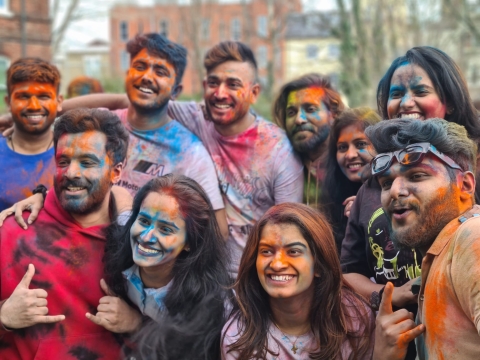
Sunday 16 March
Holi Colour Run - ticketed event *this event will be filmed and photographed*
12.00pm - Gun House Green
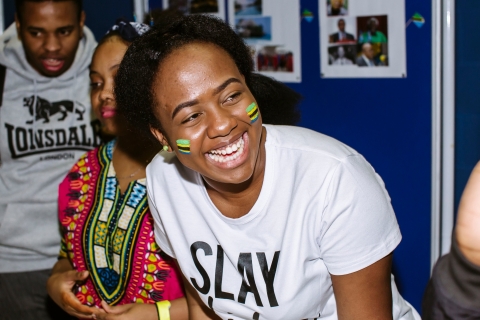
Monday 17 March
Global Messages of Goodwill - an art and craft event
11.00am - 3.00pm - University Library
Global Menu - a variety of international dishes
11.30am - 2.00pm - The Hub / The Terrace / Chimes Cafés
Heritage Hub - exhibition
11.00am - 2.00pm - Park Building Exhibition Space
Beyond Borders - panel discussion with students, alumni and staff - ticketed event
4.00pm - 6.00pm - Park Building Café
The Road to Karachi - a presentation from Nadia Arab with drinks and nibbles
5.30pm - Chimes Cafe, University Learning Centre
International Film Screening: Parasite (South Korea) - 2020 Best Picture Oscar winner
6.30pm - 9.00pm - Eldon Building
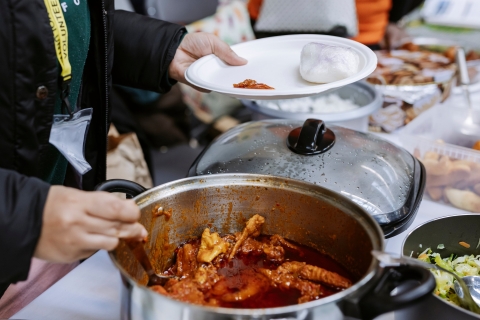
Tuesday 18 March
Football Fever! - 7-a-side football tournament - *this event will be filmed and photographed* - ticketed event
11.00am - 2.00pm - Langstone Sport Site
Global Messages of Goodwill - an art and craft event
11.00am - 3.00pm - University Library
Portsmouth Central Library Mobile Tuktuk - celebrating global literature
11.00am - 3.00pm - The Plaza
Global Menu - a variety of international dishes
11.30am - 2.00pm - The Hub / The Terrace / Chimes Cafes
Beach Walk - a walk along the seafront
11.30am - 1.00pm - University Chaplaincy
Karen Blackett, Chancellor of UoP - "How having a global mindset shaped my success" - ticketed event
12.00pm - 1.00pm - Richmond Building LT2
International Alumni Tips for UK Career Success - ticketed event
4.00pm - 5.30pm - Careers and Employability Centre
Global Monsters: Film Panel discussion - ticketed event
5.00pm - 6.30pm - Online event
International Film Screening: The Lunchbox (India) - a love story centred around food and human connection
6.30pm - 8.15pm - Eldon Building
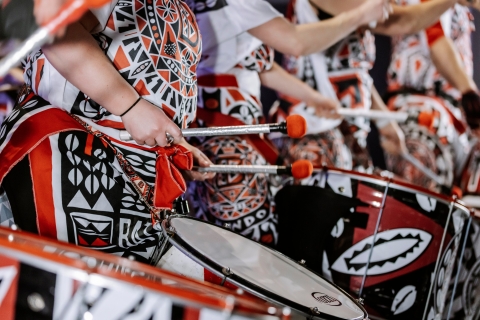
Wednesday 19 March
How to succeed in a UK postgraduate degree as an international student - ticketed event
9.30am - 10.30am - Online
Humanities and Social Sciences Global Day - a variety of events celebrating global culture
9.30am - 5.00pm - Park, LRC and St George's Buildings
Summer Mobilities Showcase - discover summer mobility opportunities
9.30am - 12.00pm - Eldon Foyer, Eldon Building
Health Without Borders: A Biomedical Scientist's global tour of human disease
10.00am - 11.00am - St Michael's Building, SM2.07
Showcasing Global Engagement at BAL - exhibition
11.00am - 12.00pm - Richmond Building Atrium
Global Menu - a variety of international dishes
11.30am - 2.00pm - The Hub / The Terrace / Chimes Cafés
International Tea - a quiz and tea
1.00pm - 2.00pm - King Henry Building, Student Room 1.05
Global Bake Off
1.00pm - 2.00pm - Science and Health Faculty Office (Staff Only)
Share Your Experiences: Spirituality and Culture
3.00pm - 4.00pm - Multi-faith Room, Chaplaincy
Portsmouth in the Republic of Guinea - showcasing Portsmouth residents' support of international education
6.00pm - 8.00pm - Eldon Building, W1.10
Iftar - everyone is welcome to this community Iftar where food is provided
6.00pm - University Chaplaincy, St Pauls Road
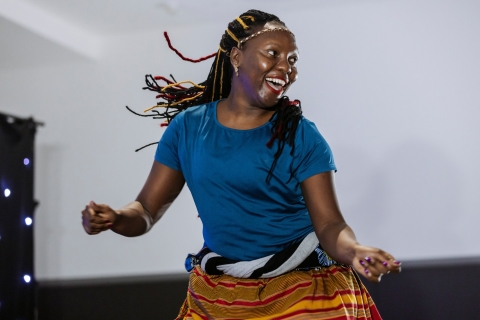
Thursday 20 March
Global Menu - a variety of international dishes
11.30am - 2.00pm - The Hub / The Terrace / Chimes Cafés
Festival of Cultures - exhibition - *this event will be filmed and photographed*
11.30am - 3.00pm - Ravelin Sports Centre
Solent Language Hub Visit - groups of local school children visiting Festival of Cultures
1.00pm - 2.00pm - Ravelin Sports Centre
Board Games and Lego at Chaplaincy
2.00pm - 4.00pm - Chaplaincy Lounge
Chaplaincy Quiz
4.00pm - 5.00pm - Chaplaincy Lounge
International Film Screening: Atlantique (Senegal) - "Arranged to marry a rich man, young Ada is crushed when her true love goes missing at sea during a migration attempt - until a miracle reunites them"
5.30pm - 7.30pm - Eldon Building, W1.11
Performance Showcase - performances from across the world - *this event will be filmed and photographed*
6.00pm - 8.00pm - Ravelin Sports Centre
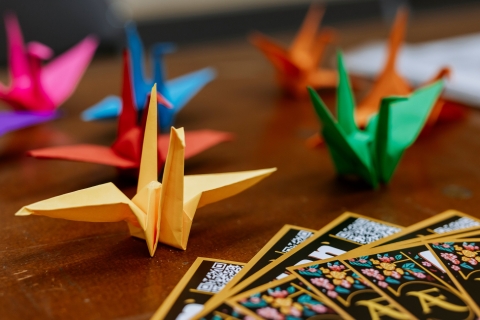
Friday 21 March
Global Menu - a variety of international dishes
11.30am - 2.00pm - The Hub / The Terrace / Chimes Cafés
Chris Lubbe - Nelson Mandela's former bodyguard - In person talk - ticketed event *this event will be filmed and photographed*
1.00pm - 2.00pm - St Michael's Building, SM1.01
ISA x UPSU Global Smartphone Quiz - ticketed event
6.00pm - 8.00pm - Student's Union, Third Space
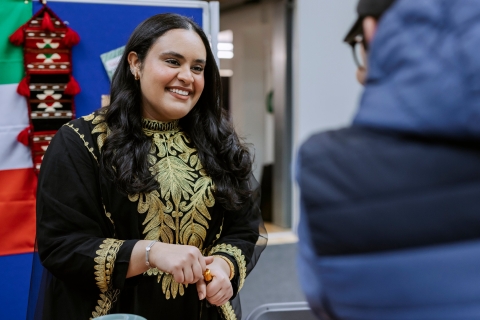
Saturday 22 March
A Language Learners Dream Day! Cornish - ticketed event
10.00am - 10.55am - Online
A Language Learners Dream Day! Welsh - ticketed event
11.00am - 11.55am - Online
A Language Learners Dream Day! Russian - ticketed event
1.00pm - 2.00pm - Online
Global Week 2025 | 15-23 March
.






